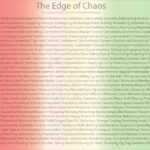The 3 Rs of Creativity and Careers
I found myself coining a new phrase to capture some of the key ideas in career development. The phrase is:
- Reinvent,
- Respond,
- Resort
The idea flowed from an inspiration from Steve Jobs being interviewed by Stephen Fry in Time Magazine. Jobs responding to Fry’s question about his “career” said “”I do stuff. I respond to stuff. That’s not a career — it’s a life!”. Herein is a great way of thinking about 21st century careers “I do stuff. I respond to stuff”. Indeed it reminds me of what Tim Costello said at conference in Melbourne last year “My career has not been linear, rather I made the best decisions I could at the time”. (I used that last quote in my youtube video on Chaos Theory of Careers and Reinvention) video.

The Problem with “Career”
A lot of commentators have argued that the term “career” no longer adequately describes the experience of work, non-work roles, education and so on. Modern paid employment is increasingly unstable, interrupted and unpredictable. For some the response is that we can “design” a life, however for me such a term too closely resembles the traditional predict and control ideas associated with careers in stable labor markets. The metaphor of jazz improvisation is close to my heart as a jazz lover, the idea of making it up as you go along – or more accurately reinventing, responding and resorting. Such an approach inevitably leads to notions of creativity. Making the move from predictability and design, to improvisation and creativity is a significant one, because it allows counsellors, coaches and educators to put their efforts into fostering these desirable qualities, and from these a career will emerge. In Steve Jobs’ words, it encourages us to do stuff and respond to stuff.
One of the consequences of making this shift is that we move from predictions to patterns (see my paper with my friend Robert Pryor called “Shiftwork” in the Australian Journal of Career Development, or look at a earlier post here. Some of the patterns that are worth looking at are ones associated with successful creativity and imagination or improvisation. For instance Steve Jobs and his colleagues at Apple are often the focus of enquiries into their success. Jobs’ own comment that “creativity is making the links” is instructive, as it provides a practical clue to creativity. This is explored in my Beyond Personal Mastery® model of Creativity (see Beyond Personal Mastery website.
We can also study failure in creativity (failure is an important and neglected component of career development see the presentation “Failing Sucessfully” with Robert Pryor in podcast form on this site for more details). For instance 9/11 has been described by terrorism experts as a “failure of imagination” on behalf of the security forces because they had failed to imagine the awful tactics that the terrorists would employ. It turns out that the security game is a creative challenge in the same way that to a greater or lesser extent all occupations are. In John Paul Getty’s words if you haven’t got a problem, you haven’t got a job. Jobs are exercises in problem solving. If there were no problem to solve, why employ a person? The solution to that problem can be an employee – but where is the employee located? Is it cheaper to employ that person in India or China? Secondly, it is cheaper or faster (ie more efficient) to get a machine or computer to solve the problem and finally is does the solution to the problem produce something that people need or want? These are Dan Pink’s three questions from his Whole New Mind book (2005) – is what you are offering meeting the challenges of Asia, Automation and Abundance. Perhaps the most likely way to fail to rise up to this challenge is to fail to generate creative solutions to whatever problems are posed.
For me making this move from predictability and control to unpredictability, patterning, improvisation and reinvention – creativity permits us to engage in tasks that address the challenges everyone of us face in order to survive and thrive in life. Patterns will emerge in our lives over time, and inevitably we will fall into the trap of oversimplifying them into a story which is better than trying to describe them in terms of an assortment of trait test scores, but still represents, be in no doubt, an oversimplified and usually overly neat version of events. We can look into those stories and scores (for both can be very useful) to help us make our next moves, but we can do so much more by also straining to see the possibilities and not just the probabilities (see the paper with my friends Norm Amundson and Robert Pryor in Career Development Quarterly on this point, or look at the Creative Thinking Strategies cards that address this as a practical thinking tool CTS cards link. We want to encourage people to be continually trying to make new links and associations, which implies continually experiencing new things and reflecting and learning, as well as trying things out, which in turn will need to new insights and experiences and so on – the essence of Beyond Personal Mastery® indeed.
“Careers” do not exist in their own right, rather if “a career” means anything it is a description of the pattern of experiences, thoughts, learning and reflections that emerge from “doing stuff” and “responding to stuff”, indeed it comes from continually Reinventing, Responding and Resorting. In the Chaos Theory of Careers terms it is an emergent pattern generated by the complex dynamical systems that we are and that we interact with. It also follows that his pattern will not be totally random, but will have a structure that repeats, but it may well be exceedingly complex and prone to sudden unpredictable reconfiguration.
That is why these three words resonate for me when thinking about careers: Reinventing, Responding, and Resorting
Reinventing
Invent from the latin “venir” to come, and so invent to come upon, or find. Re-invent, to come upon again, find again, or find another. Hence when we talk of “finding ourselves”, we are inventing or re-inventing ourselves. However because we are so beautifully complex and ever-changing, there are infinite things to find out, or come upon, so and there are an infinite number of ways that we can reinvent ourselves. Some of these reinventions may simply be a matter or “tweaking”, “tightening” or “tuning”, but never under-estimate the benefits of a well tuned instrument or well-tuned engine, often it makes all the difference between success and failure. However even the best instruments or engines need a re-tune. In my office at the recording studios, whenever musicians come in to record and need the Yamaha CFIII 9’ Concert Grand, a piano tuner is employed to make sure it is right, and there is always something that needs doing. As I said even the best need this. So even for those for whom things seem to be going fine, there is still the need for reinvention.
For those for whom things are not going so well, reinvention is more obviously necessary and pressing. The changes required may also not be much more than a re-tune, but may require much more significant reinvention. Sometimes it is hard to recognise it is the same person at the end of it.
Reinvention is a central concept in many career development theories in so far as it implies a conscious and thoughtful approach, it emphasises the planning and designing elements. It has a certain rationality associated with it. It is not hard to see the relevance of ideas such as Arthur’s Intelligent career “knowing why, knowing how, knowing whom” or Acjzen’s Planned Behaviour – Behavioral, Normative and Control Attitudes, or Constructivist notions such as writing the next chapter, or indeed classic positivistic ideas about matching and planning (e.g. Holland 1959, Dawis & Lofquist, 1984). All of the approaches cited emphasise the importance of “Think before you act”. Action is primarily based upon a rational consideration of what we know or believe and what we perceive we want or need to do.
However I mean Reinvention in a broader sense that also includes spontaneous, continuous and unplanned reinvention. I am not at all sure outside of the confines of a counsellor’s office whether we consciously design our lives or spend time writing the next chapters. I am not even sure it is possible. How does it work? We sit down and literally or metaphorically write the next chapter? But the act of projecting into this future takes time and hence intrudes into that future, meaning that whatever we see at the beginning of the future in our projections cannot be, because we are too busy thinking about it, to allow it to happen. Hence immediately there is a slippage between what we think will happen next and what does happen next. If you believe in sensitivity to initial conditions and non-linearity (i.e. that small changes now can have profound impacts later) then these slippages really matter.
This is in essence a variation of Kitching’s (2008) reminder that we not only think about the world, we act in it too. Discoveries about the world are made by acting in the world as well as thinking about it. Experience is not limited to the experience of thinking, but generally and more commonly is comprised of action. Why does this matter? Because I believe that privileging “Think before you act” over “Act before you think” is limited and limiting when it comes to careers. The Chaos Theory of Careers characterises all of us as ultimately limited in our knowledge and that ourselves and our world are ultimately never fully knowable. Thus there is always uncertainty in any situation. The rational/cognitivist response (the dominant view in Careers) is to acknowledge that fact and then seek to eliminate as much uncertainty as possible through rational thought, planning and so forth. No matter how well we do this, not all contingencies can be imagined, and sometimes acting in the world is a more efficient way of discovering them and learning. Thought compliments action, it is not necessarily pre-eminent. Action provides the content for the narrative, and a script provides the motivation for action.
That people often act, and sometimes without a well articulated plan ought to be self-evident from countless recollections from people in all walks of life, including the comment from Steve Jobs, “I do stuff”. We often act on the basis of hunches or impulse yet such behaviour is frowned upon or not readily accounted for in most Career Development theories.
For professionals working the field the challenge is how do we help people reinvent themselves, what are the processes involved, and what works best when and how. There is a practice and research agenda right there!
Responding
from spondere to promise or pledge, hence pledge in return – respond. Often it is how we respond to changing events that can influence or even determine our “career” success. It is understandable but unfortunate that those who are confronted by a serious setback may respond with negativity, self-limited thinking and perhaps even depression making it even more difficult to respond in a positive way. Responding to failure by saying “that’s interesting” rather than “why me” or “never again” may help in learning rather than ingraining an avoidance philosophy.
Recognising the need to be responsive and that we will inevitably have to respond to things is an important first step. Again I would argue that traditional approaches in our field that emphasise predictability, planning and goal-setting serve to diminish the importance of responding. If you have everything planned, then responses are predictable and well thought through. Sometimes this is a very sensible thing to do, but on occasions the ability to respond spontaneously, authentically, quickly, and to unexpected events can be critical. Rather I argue that we need to privilege Responding and Responsiveness and support, model, coach, teach, educate and research effective responding. What does it mean to respond? How do we avoid characteristic responses? How do we avoid responding in the most expedient manner? How could we respond creatively? What are benefits of delaying responding? How can be learn to trust hunches? How can be improve our responses to the unexpected? Etc.
Resorting
The last word, the final resort, perhaps seems to be least comfortably appropriate word here. Resort – from sortir to go (out), hence to go, to act. I also mean re-sort as in rearrange here. Hence I like the word because it can imply action as well as rearrangement, and of course resorts are nice places to go to!
So in my first sense here, Resorting means acting or “doing stuff”. Through action new possibilities arise, as set out in the Action Steps of Beyond Personal Mastery®. It also implies the implementation of hitherto unused options – i.e. I had to resort to climbing in through the window. Often we are at our most creative when we are obliged to resort. It implies “stretch” a term that is trendy amongst HR practitioners as in a “stretch assignment” one that encourages the person to maximise their potential and use all of their resources.
In the second sense Re-sort, the term captures that often creativity and reinvention are right under our noses waiting to be discovered. It can often be a case of taking existing things and combining them in novel ways. Sometimes we discover these things by accident or failure, like failing to wash our hands! The artificial sweetener Saccharin was discovered when chemist Constantin Fahlberg didn’t wash his hands after a day at work. Fahlberg was trying to come up with new uses for coal tar. After going home noticed the rolls he was eating tasted sweet. He asked his wife if she had done anything interesting to the rolls, but she hadn’t. They tasted normal to her. Fahlberg realized the taste must have been coming from his hands — which he hadn’t washed.
In career terms re-sorting can occur by taking a fresh look at our knowledge, skills and abilities – our transferable skills if you will and finding new connections or arrangements of them. Sometimes University degree courses and trade training will deliberately encourage students to “think like a” psychologist/engineer/doctor/plumber/chef etc. While this serves a purpose, it may also discourage the person to think more laterally or creatively about their knowledge and skills. It is not uncommon for students so-encouraged years later to have an epiphany as they come to the realisation that they can combine their training with other experiences in a way that is creative, effective and yet still ethical. Stoltenberg and Delworth (1987) model of Supervision captures this type of notion in their level 3 supervisor who “shows increased professional self-confidence, with only conditional dependency on the supervisor. He or she has greater insight and shows more stable motivation. Supervision becomes more collegial, with sharing exemplification augmented by professional and personal confrontation”.
Re-sorting can be aided by “professional and personal confrontation” – i.e. by challenging ourselves in terms of what we think we know, and to also think about what we know we dont know, and what we dont know we know and finally Taleb’s (2007) Black Swans – what we don’t know we don’t know. Taleb calls such cases Black swans, because in the past Europeans thought all swans were white and did not know that they did not know that in Perth, swans are black.
So continually re-sorting our knowledge and skills is also a critical component of career creativity.
So there is my Kick Rs approach to being creative in Careers. Those three words: Reinventing, Responding, Resorting may seem simple but as I’ve tried to illustrate, or at least alluded, they depend on a whole new approach to Career Development derived from Robert Pryor and Jim Bright’s Chaos Theory of Careers, Shiftwork, Beyond Personal Mastery® and the work of other leading thinkers in this field including Norm Amundson, Spencer Niles, Mark Savickas, Raoul von Esbroeck, Jean-Pierre Dauwalder and many others.
References
Ajzen, I. (1991). The theory of planned behavior. Organizational Behavior and Human Decision Processes, 50, 179-211
Bright, J.E.H. & Pryor, R.G.L.. (2008). Shiftwork: A Chaos Theory Of Careers Agenda For Change In Career Counselling. Australian Journal of Career Development. 17(3), 63-72.
Bright J.E.H. & Pryor R.G.L. (2005). The chaos theory of careers: a users guide. Career Development Quarterly. Vol 53(4) Jun 2005, 291-305
Dawis, R. V., & Lofquist, L. H. (1984). A psychological theory of work adjustment. Minneapolis:
University of Minnesota Press.
Holland, J. L. (1959). A theory of vocational choice. Journal of Counseling Psychology, 6, 35-45.
Kitching, G. (2008). The trouble with Postmodernism. UNSW press.
Pink, D. (2005). A whole new mind. Allen and Unwin.
Pryor R.G.L., Amundson, N., & Bright, J. (2008). Possibilities and probabilities: the role of chaos theory. Career Development Quarterly 56 (4), 309-318.
Savickas et al (2009). Life Designing. Journal of Vocational Behavior.
Stoltenberg, C. D., & Delworth, U. (1987) Supervising counselors and therapists. San Francisco, CA: Jossey-Bass.
Taleb, N. (2007). The Black Swan. Random House.
Related Posts









Pingback: Transform your career by shifting: Shift 10 - From Knowing In Advance To Living With Emergence | The Factory